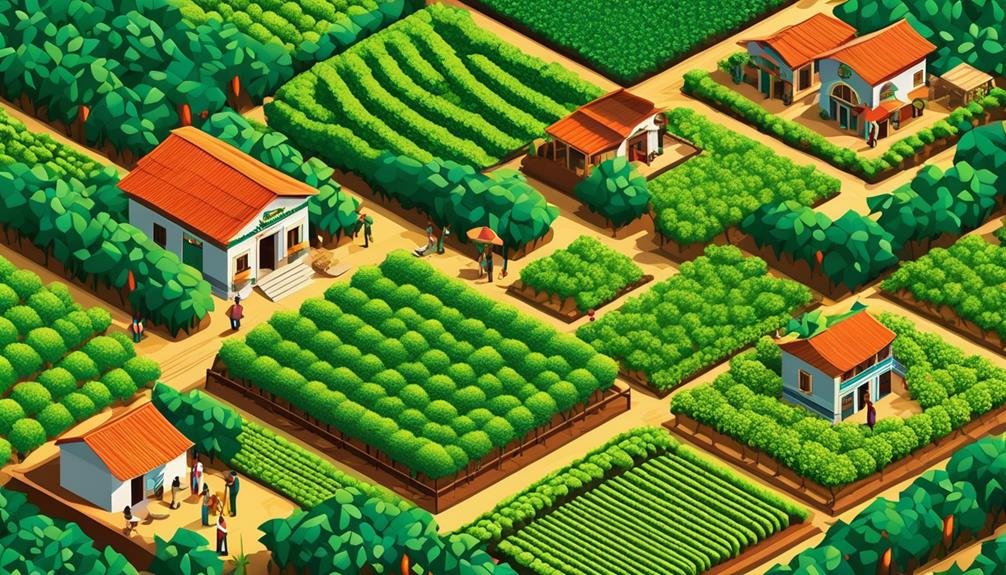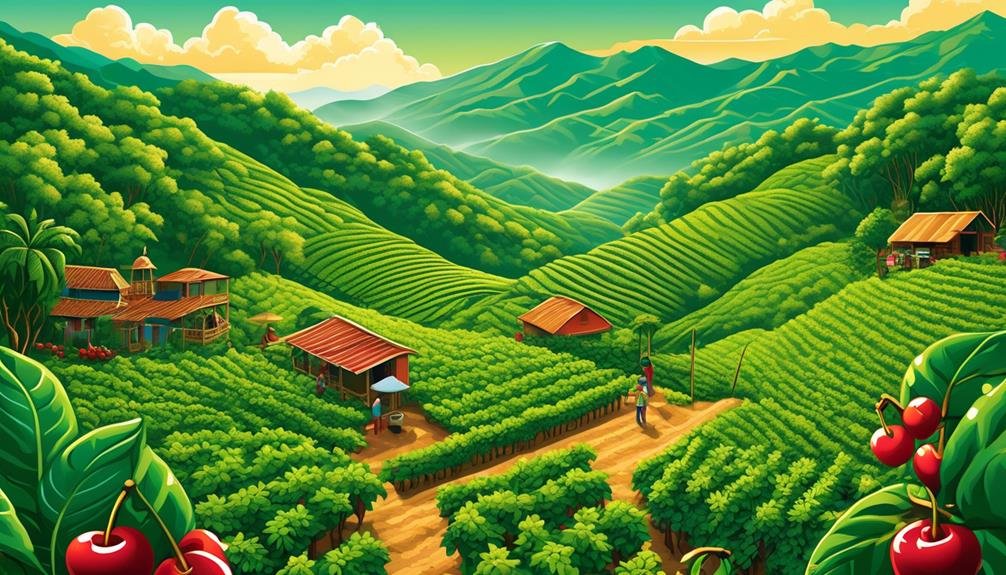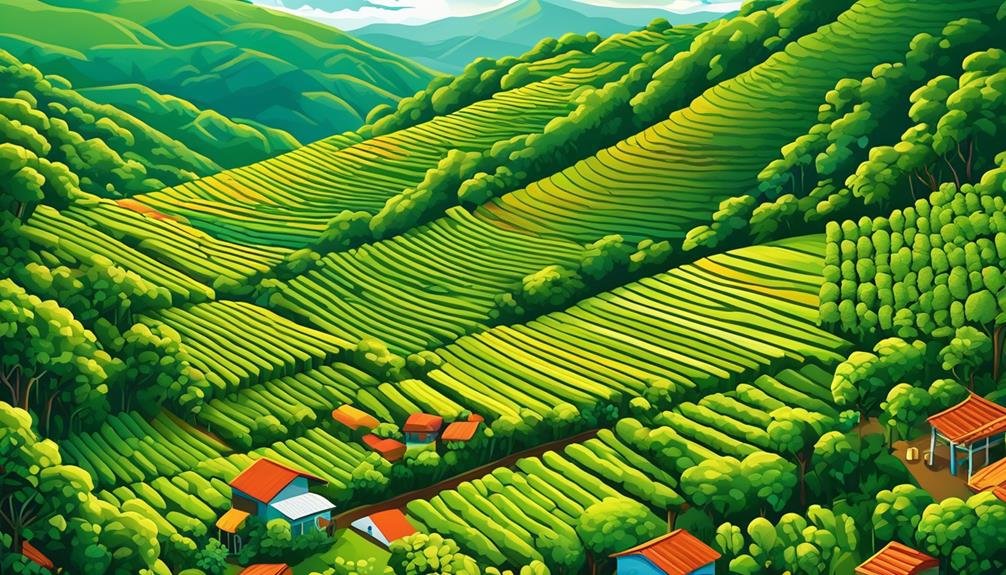Did you know that Brazil is not only the largest coffee producer but also known for its high-quality coffee?
With such a diverse range of countries and flavors, you might be wondering which are the best coffee growing countries.
Well, let's discover together the top coffee producers, including Vietnam, Colombia, Indonesia, Honduras, and Ethiopia.
Each country has its unique characteristics and flavors that make their coffee stand out.
So, grab your favorite mug and get ready to explore the world of coffee!
Key Takeaways
- Brazil is the largest coffee producer globally, known for its high-quality coffee and cultivation of both Robusta and Arabica beans.
- Vietnam is the second-largest coffee producer globally, renowned for its Robusta coffee beans and contributing 40% of the world's Robusta production.
- Colombia, the third-largest coffee producer globally, predominantly produces Arabica beans and has ideal conditions for growing coffee at elevations of 1500-2000 meters.
- Ethiopia, the birthplace of coffee, is the sixth-largest coffee producer globally and is known for its exceptional quality, unique flavors, and rich coffee culture.
Brazil
Brazil, the largest coffee producer in the world, has maintained its dominance in the industry for over 150 years. With an annual production of 2.68 million metric tons, Brazil is known as one of the top coffee-producing countries globally. The coffee produced in Brazil is widely recognized for its high quality, making it a popular choice for blends.
Brazil's ideal climate, coupled with its vast agricultural land, allows for the cultivation of both Robusta and Arabica beans. This diversity in coffee varietals contributes to the country's ability to meet the demands of different coffee markets. Brazil's expertise in coffee farming and processing has established it as a leader in the specialty coffee industry.
Brazilian coffee is grown in various regions across the country, including Minas Gerais, Sao Paulo, and Parana. These regions offer different microclimates and altitudes, resulting in a wide range of flavors and profiles in the coffee produced. From nutty and chocolatey notes to fruity and floral undertones, Brazilian coffee caters to the diverse preferences of coffee enthusiasts worldwide.
As the largest coffee producer, Brazil plays a crucial role in satisfying the global demand for coffee. Its rich coffee heritage, commitment to quality, and consistent production volumes have solidified its position as a top player in the coffee industry. Whether enjoyed alone or blended with other beans, Brazilian coffee continues to be cherished by coffee lovers around the world.
Vietnam
Vietnam has emerged as a significant player in the coffee industry, ranking as the second-largest coffee-producing country worldwide. With an annual export of over 1.5 million metric tons, Vietnam's coffee crops contribute 40% of the world's production of Robusta beans. The country's coffee industry experienced substantial growth after private investors were allowed in 1986, propelling Vietnam to the forefront of the global coffee market.
Vietnamese coffee is renowned for its production of Robusta coffee beans. The light acidity and mild body of Vietnamese coffee make it a popular choice for blending with other types of coffee. In fact, Vietnamese coffee is often used to enhance the flavor profiles of blends from various regions, including Indonesian coffee.
The success of Vietnam's coffee industry can be attributed to its focus on Robusta production. While other coffee-growing countries like Brazil primarily focus on the production of Arabica coffee, Vietnam has capitalized on the demand for Robusta beans. This strategic decision has allowed Vietnam to establish itself as the largest coffee-producing country for Robusta beans, solidifying its position in the global coffee industry.
Colombia

Colombia, known as the third-largest coffee producer globally, plays a significant role in the coffee industry with its production of over 760 thousand metric tons per year. Colombian coffee is highly regarded for its quality and is sought after by coffee enthusiasts around the world. Let's take a closer look at why Colombia is considered one of the best coffee-growing countries.
| Key Facts | |
|---|---|
| Varieties of Coffee | Colombia predominantly produces Arabica beans, known for their aromatic, mild, and fruity flavors. |
| Ideal Conditions | The coffee plantations in Colombia are located at elevations of 1500-2000 meters. This altitude, combined with the country's unique microclimates, creates ideal conditions for growing coffee. |
| History of Coffee Production | Colombia has a long and rich history of coffee production, dating back to the 18th century. Its coffee industry has played a significant role in the country's economy, accounting for a substantial portion of its GDP. |
| World's Largest Producers | Colombia is one of the world's largest coffee producers, supplying approximately 15% of the global coffee demand. |
Colombia's commitment to producing high-quality coffee has earned it a stellar reputation in the coffee industry. The country's ideal growing conditions and focus on Arabica beans result in a medium-bodied coffee with a nutty aroma and citrus acidity. Whether you enjoy a cup of Colombian coffee at home or at your favorite café, you can savor the flavors and appreciate the expertise that goes into each batch.
Indonesia
Indonesia, the fourth-largest coffee-producing country globally, boasts a rich history of coffee production dating back to the late 1600s during the Dutch colonial period. With an annual yield of over 668 thousand metric tons, Indonesia plays a significant role in the global coffee market.
What makes Indonesian coffee stand out? Let's explore:
- Diverse Coffee Varieties: Indonesia is known for its diverse coffee varieties, such as Java coffee. This particular variety offers woody and earthy flavors with a rich and full body, making it a favorite among coffee connoisseurs.
- Earthy and Spicy Flavors: Indonesian coffee is often used in blends due to its distinctive earthy notes and complex spicy flavors. It adds depth and character to coffee blends enjoyed by many in countries around the world.
- Ideal Growing Conditions: Indonesia's warm and damp climate provides ideal conditions for growing coffee. The island of Java, in particular, has volcanic soil and receives a significant amount of rainfall, creating the perfect environment for coffee trees to thrive.
- Traditional Processing Methods: Indonesian coffee is typically wet-processed to enhance its flavor profile. This method involves removing the coffee cherries' outer skin and pulp before drying the beans. The traditional approach contributes to the high-quality and unique taste of Indonesian coffee.
Indonesia's coffee industry continues to flourish, offering a wide range of flavors and profiles to satisfy coffee enthusiasts worldwide.
Honduras

With its position as the fifth-largest coffee producer and a reputation for taste and authentic character, Honduras emerges as a noteworthy contender in the global coffee market. Despite facing challenges due to poor infrastructure in the past, Honduras has managed to establish itself as a significant player in the coffee industry.
Coffee production in Honduras has reached an impressive annual production of over 475 thousand metric tons. This is a testament to the country's dedication to cultivating high-quality coffee cherries. The unique combination of warm, tropical temperatures and ample moisture in Honduras creates ideal conditions for coffee cultivation.
Honduras' coffee is grown on small farms located in the mountains, at altitudes ranging from 1400 to 1700 meters. This elevation contributes to the wide range of flavors and aromas found in Honduran coffee. The country's coffee is sought after for its distinct taste and authentic character.
While Honduras may not have the same level of recognition as Costa Rica, Colombia, or Brazil, it holds its own in the coffee industry. Honduran coffee can be compared to Yemeni coffee in terms of taste and flavor profile, and it stands shoulder to shoulder with Guatemalan coffee, El Salvadoran coffee, Kenyan AA, Ugandan coffee, and Puerto Rican coffee.
Ethiopia
Ethiopia, the birthplace of coffee and the sixth-largest coffee producer in the world, showcases a rich heritage and diverse range of coffee bean varieties known for their exceptional quality and unique flavors.
Here are some key facts about Ethiopia's coffee industry:
- Ethiopia produces over 421 thousand metric tons of coffee annually, making it one of the top coffee growing countries in the world.
- The country's coffee beans are highly sought after for their rich flavor profile, which is a result of the unique combination of climate, altitude, and soil conditions found in Ethiopia.
- While the best coffee is typically reserved for local consumption, Ethiopia also exports high-quality coffee to the global market, contributing significantly to the country's economy.
- Ethiopia's coffee industry is deeply intertwined with its rich cultural heritage, with coffee ceremonies being an integral part of the social fabric.
- The majority of coffee production in Ethiopia is carried out by small farmers, who cultivate coffee on small plots of land using traditional methods.
Ethiopia's commitment to producing coffee of exceptional quality, combined with its rich history and the expertise of its small farmers, sets it apart as a significant player in the global coffee market.
The country's unique flavors and rich coffee culture make it a must-visit destination for coffee enthusiasts seeking to explore the origins of this beloved beverage.
Frequently Asked Questions
What Country Grows the Best Coffee?
You might wonder which country grows the best coffee. Well, let's explore the coffee-growing world. Brazil is renowned for its high-quality Arabica and Robusta beans, while Colombia offers aromatic and mild Arabica beans with a nutty aroma and citrus acidity. Vietnam specializes in Robusta beans and contributes a significant portion of the world's production. Indonesia stands out with its diverse varieties, offering earthy and complex spicy flavors. Ethiopia, known for its top-quality exported coffee, boasts a wide range of coffee bean varieties.
Which Country Is No 1 Coffee in the World?
Brazil is the number one coffee producer in the world. With ideal growing conditions and a large annual production of 2.68 million metric tons, Brazil dominates the global coffee market.
Who Makes the Best Coffee in the World?
You make the best coffee in the world by using beans from countries like Brazil, known for high-quality blends, Vietnam for Robusta beans, Colombia for aromatic Arabica beans, Indonesia for diverse flavors, and Honduras for authentic character.
What Region Is Best for Growing Coffee?
The best region for growing coffee varies depending on factors such as climate, altitude, and soil conditions. Different regions, such as Brazil, Vietnam, Colombia, Indonesia, and Honduras, have unique qualities that contribute to the production of high-quality coffee beans.
Conclusion
In conclusion, Brazil, Vietnam, Colombia, Indonesia, Honduras, Ethiopia, Peru, India, Guatemala, and Uganda are recognized as the best coffee growing countries. These countries excel in producing high-quality coffee beans, each with its unique characteristics and flavors.
From Brazil's renowned quality and Vietnam's robusta beans to Colombia's aromatic arabica beans and Ethiopia's diverse range of varieties, these countries showcase the expertise and dedication of their coffee industries.
Whether it's the earthy flavors of Indonesian coffee or the sustainable practices of Ugandan farmers, these countries are at the forefront of the global coffee market.




